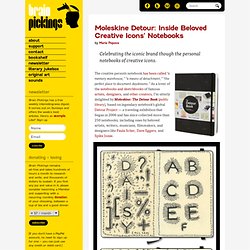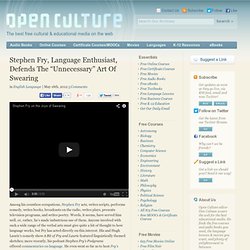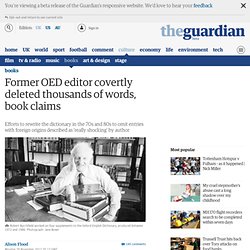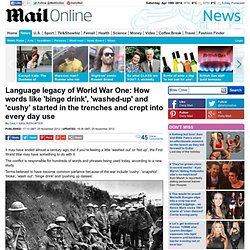

Moleskine Detour: Inside the Notebooks of Beloved Creative Icons. By Maria Popova Celebrating the iconic brand though the personal notebooks of creative icons.

The creative person’s notebook has been called “a memory warehouse,” “a means of detachment,” “the perfect place to document daydreams.” As a lover of the notebooks and sketchbooks of famous artists, designers, and other creators, I’m utterly delighted by Moleskine: The Detour Book (public library), based on legendary notebook’s global Detour Project — a traveling exhibition that began in 2006 and has since collected more than 250 notebooks, including ones by beloved artists, writers, musicians, filmmakers, and designers like Paula Scher, Dave Eggers, and Spike Jonze. Paula Scher, graphic designer, USA. Stephen Fry, Language Enthusiast, Defends The “Unnecessary” Art Of Swearing.
Among his countless occupations, Stephen Fry acts, writes scripts, performs comedy, writes books, broadcasts on the radio, writes plays, presents television programs, and writes poetry.

Words, it seems, have served him well, or, rather, he’s made industrious use of them. Anyone involved with such a wide range of the verbal arts must give quite a bit of thought to how language works, but Fry has acted directly on this interest. His and Hugh Laurie’s comedy show A Bit of Fry and Laurie featured linguistically themed sketches; more recently, his podcast Stephen Fry’s Podgrams offered commentaries on language.
He even went so far as to host Fry’s Planet Word, a five-part BBC television series on language, “how we learn it, write it and sometimes lose it, and why it defines us.” Given Fry’s position as a bastion of modern British wit who cares deeply about the words we speak and write, you might assume he uses only the highest, most refined kind of English. Related content: Former OED editor covertly deleted thousand of words, book claims. An eminent former editor of the Oxford English Dictionary covertly deleted thousands of words because of their foreign origins and bizarrely blamed previous editors, according to claims in a book published this week.

Robert Burchfield's efforts to rewrite the dictionary have been uncovered by Sarah Ogilvie, a linguist, lexicographer and former editor on the OED. Ogilvie worked for 11 years to research and write Words of the World, published by Cambridge University Press, which challenges the widely held belief that editors of the OED between 1884 and 1933 were Anglocentric Oxford dons obsessed with preserving the Queen's English, and that it was not until Robert Burchfield's four supplements, produced between 1972 and 1986, that the dictionary was opened up to the wider world. "I observed a pattern, that actually it was the earlier editors who were dealing with words in a really enlightened way.
"This is really shocking. If a word gets into the OED, it never leaves. How the mixing of millions of soldiers during World War One led to words such as 'binge drink', 'washed up' and 'cushy' enter everyday use. By Daily Mail Reporter Published: 17:13 GMT, 25 November 2012 | Updated: 18:36 GMT, 25 November 2012 It may have ended almost a century ago, but if you're feeling a little 'washed out' or 'fed up', the First World War may have something to do with it.

The conflict is responsible for hundreds of words and phrases being used today, according to a new study. Terms believed to have become common parlance because of the war include 'cushy', 'snapshot', 'bloke', 'wash out', 'binge drink' and 'pushing up daisies'. Trench talk: The coming together of millions of soldiers from different countries during World War One brought many military slang phrases into mainstream use Terms believed to have become common parlance because of the war include 'cushy', 'snapshot', 'bloke', 'wash out', 'binge drink' and 'pushing up daisies' Historians Peter Doyle and Julian Walker have analysed thousands of documents from the period.
Lousy - Refers to being infested with lice 'It was a very creative time for language.